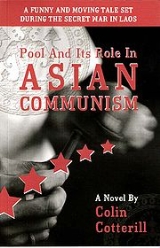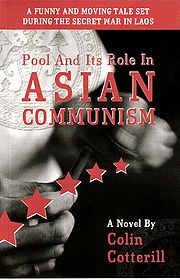
Pool and its Role in Asian Communism
Encyclopedia

Colin Cotterill
Colin Cotterill is a London-born teacher, crime writer and cartoonist. Cotterill has dual English and Australian citizenship; however, he currently lives in Southeast Asia, where he writes the award-winning Dr...
and published in 2005 by Asian Book, Bangkok (ISBN 974-8303-76-4).
Plot summary
1970:Waldo Monk is black, 65, a widower and two months from retirement from Roundly's Pool and Billiard factory in Indiana. Saifon is a Lao-American girl who arrived in the USA under mysterious circumstances when she was a child. She pretty much hates everyone, and for good reason.
It's Waldo's unenviable task to train her up to take over his job. He can't stand her and she shows little aptitude for the ball business. But over his final months, they come to an understanding, maybe even a fondness for each other. Two disasters in Waldo's life turn all his plans upside down. Somehow, he and his dead wife, Aretha end up adopting Saifon. Against Saifon's wishes, her new dad follows her to Southeast Asia as a minder.
While trying to solve the mystery of Saifon's past, they become entangled in the confusion of the region: the Air America bombing, the Lao Socialist movement, the CIA, the Thai Communists, and a network of smuggling war profiteers.
With the help of a CIA agent, they set about breaking down the network of traffickers still smuggling war orphans out of Laos. During this exciting period, Saifon takes a job as a cabaret singer in a whorehouse, and Waldo manages to get himself shot, and kidnapped. By drawing on his factory experience, he's able to steer the kidnappers in a more profitable direction.
Saifon traces the traffickers through to Bangkok. Even though it seems they've cornered them, everything comes down to a high profile court case, and Saifon lying her head off to give the bad guys what's coming to them.
At the airport before the journey back to the States, both Saifon and Waldo realize they have nothing to go back for. So they return to Laos, and stay there. Saifon makes an effort to regain some semblance of Lao-ness, and Waldo works part time at the Air America Commissary in Udon.
Their lives are finally content and they seem to have discovered some purpose. But then, in 1975, the American troops pull out of Vietnam and Socialist forces take over in Laos. Waldo suddenly becomes the enemy. All they've worked for is about to crumble. But they're shocked to discover that contacts they'd made earlier weren't all they seemed. One of them, a quiet guy Waldo used to play pool with, turns out to be Souphanouvong, the Red Prince, and Laos' first communist president. So with the blessing of the party, Waldo and Saifon settle in the south of Laos and run a home for kids. And there they stay until Waldo, now in his nineties, decides it's time to go home and be with Aretha.
The story is written from the perspective of an undisclosed person who got to know the pair later in their lives. With a basic grasp of English, this narrator describes their story in colloquial spoken American.

